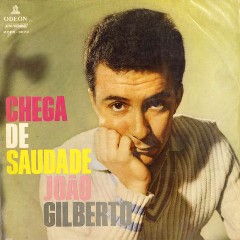João Gilberto - Chega De Saudade (1959)
João Gilberto - Chega De Saudade (1959)

A1 Chega De Saudade A2 Lobo Bobo A3 Brigas, Nunca Mais A4 Hó-Bá-Lá-Lá A5 Saudade Fêz Um Samba A6 Maria Ninguém B1 Desafinado B2 Rosa Morena B3 Morena Boca De Ouro B4 Bim Bom B5 Aos Pés Da Cruz B6 E Luxo Só Bass – Vidal Chorus – Antonio Carlos Jobim, João Gilberto, Walter Santos, Garotos da Lua Clarinet – Netinho Drums – Milton Banana, Juquinha Flute – Copinha, Altamiro Carrilho Guitar – João Gilberto, Vocals Guitar - Bola Sete, Waltel Branco Organ – Walter Wanderley Percussion – Rubens Bassini Piano – Antonio Carlos Jobim, Bene Nunes, Jose Marinho Trombone – Edmundo Maciel, Gaucho, João Donato Trumpet – Herbert Violin – Irany Pinto Vocals – Alaide Costa, Norma Bengell
João Gilberto's debut LP, 1959's Chega de Saudade, was one of the most important bossa nova recordings, and credited by many as the album that, more than any other, launched bossa nova as a major popular music genre. The dozen songs add up to a surprisingly short playing time of about 23 minutes, but introduce several of bossa nova's most beloved trademarks: breezy, soothing melodies and vocals; tight arrangements with seamless blends of clipped guitar strokes and light orchestration, and, of course, the bossa nova rhythm. The most popular of these songs ("Chega de Saudade" and "Desafinado") had already been released as singles in 1958, but though they might be the most memorable tracks, the album maintains a consistently high standard (if a fairly similar mood throughout). [The 2010 U.K. CD reissue on El adds a lot of bonus material, starting with three 1959 Gilberto recordings used in the film Orfeo do Carnaval, among them another classic, "Manha de Carnaval." Also included are no less than eleven 1957-1959 Brazilian recordings by artists other than Gilberto that are tightly or loosely aligned with the early bossa nova movement Bola Sete and Walter Wanderley being the most well known of those. Gilberto was involved in most, but not all, of these as a songwriter or guitarist, and the rationale for their inclusion is not spelled out in the CD's annotation (which, for that matter, has only basic details about these non-Gilberto tracks). It's churlish to complain about abundant extra material on a reissue CD that does include everything from the album it's based upon, but the 12-page booklet had room for such information. Packaging criticism aside, those 11 tracks by performers other than Gilberto are enjoyable and show different slants on the early bossa nova sound, sometimes instrumental, sometimes with shades of exotica (on Wanderley's organ-dominated cuts), sometimes with women singers, and sometimes poppier in approach than Gilberto's own work. Three consecutive versions of Gilberto's "Ho-Ba-La-La" (one of the songs from Chega de Saudade) seem like a programming lapse, but Norma Bengell's vocal version of that song is a highlight, as is Alaide Costa's jazzy rendering of Gilberto's "Minha Saudade."' ---Richie Unterberger, allmusic.com
download (mp3 @320 kbs):
yandex mediafire ulozto gett bayfiles








